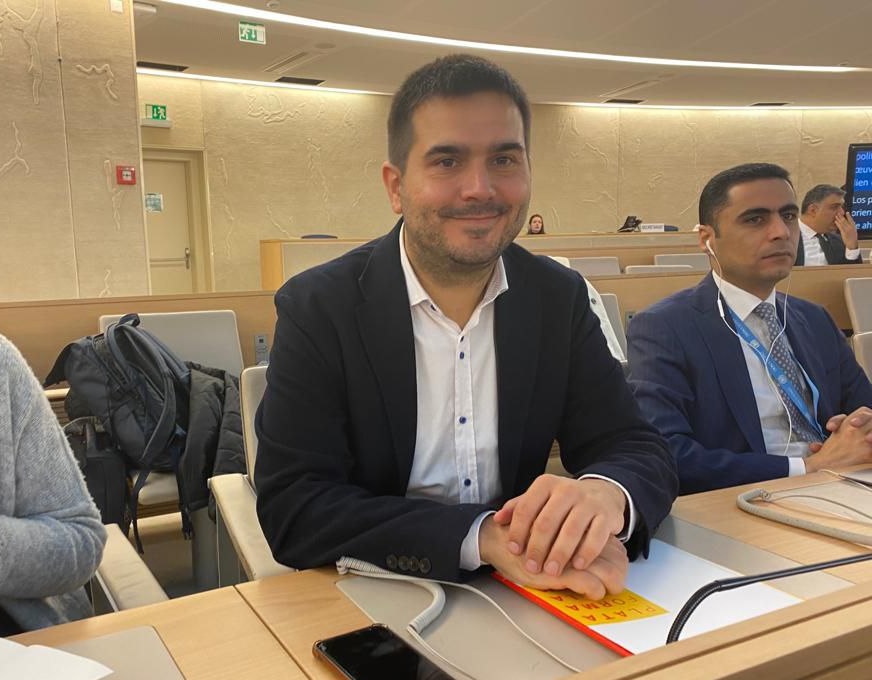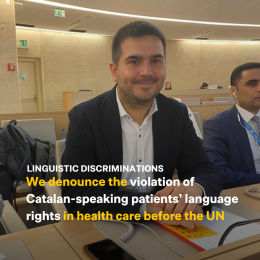Plataforma per la Llengua intervened on Friday, 1 December in the UN's Forum on Minority Issues held in Geneva (Switzerland), to call on the United Nations to intervene to guarantee the language rights of Catalan-speakers at health centres. Òscar-Adrià Ibàñez, head of the organisation's International Affairs, and Language Rights and Administration departments, complained that it is increasingly difficult for patients to get treatment in Catalan and he made several requests to the UN special rapporteur for the Minorities, Nicolas Levrat.
We are in Geneva at the @UN headquarters!
At the Forum on Minority Issues we call on the @UN_HRC to protect the right to speak Catalan in the field of health.
Our health is at stake‼️ pic.twitter.com/k5CZfYdVxd— Plataforma per la Llengua - Europa (@llenguacatEU)
Ibàñez asked both the rapporteur and the Secretary of the Forum (chosen by the UN Human Rights Council) to protect the language rights of speakers of minoritised native languages, especially in health care, and to achieve guarantees they have the option to be dealt with in their own languages at social care facilities. The organisation's representative also asked that health care systems be provided with sufficient resources to make this possible and that the workers be trained in these languages on university courses in medicine, nursing and other branches of the health care. It should be noted that, currently, the majority of new medical association members in Catalonia are people who have neither been born in Catalonia nor studied there. In the Balearic Islands, in addition, more than 80% of medical school lecturers give classes exclusively in Spanish, according to the latest language use study from the University of the Balearic Islands. Finally, the representative of Plataforma per la Llengua also asked the rapporteur to work to include medical treatment in patients' first or family language as a specific right for minorities in future international instruments.

To make the case for health care in Catalan, Òscar-Adrià Ibàñez referred to research published in the journal of the Canadian Medical Association (CMAJ) which concludes that French-speaking patients in Ontario had shorter hospital stays and a lower risk of adverse effects and mortality during admission if they were dealt with in their own language. The same was true for patients whose mother tongue was neither English nor French. Ibàñez recalled that, despite research showing that treating patients in their own language improves their prognosis, the use of Catalan with doctors has dropped by eight points in Catalonia in the last 15 years (from 47% to 39%) and the healthcare system is the area where most complaints of language discrimination are recorded in Catalonia, the Valencian region and the Balearic Islands.
16th UN Forum on Minority Issues
The Forum on Minority Issues is organised every year and is intended to promote dialogue and cooperation on issues relating to national, ethnic, religious or linguistic minorities, as well to collecting proposals to improve the international protection of these communities. This year's forum addressed the challenges faced by minorities around the world, attempting to strengthen their social and economic participation and guarantee their social equality and inclusion. Based on the contributions made by all the organisations, the special rapporteur for Minorities will make a summary, including a set of complaints and recommendations, which he will present to the United Nations Human Rights Council.
As well as Plataforma per la Lengua, Václav Bálek, President of the UN Human Rights Council, and Tangi Louarn and Davyth Hicks, vice-president and general secretary of the European Language Equality Network (ELEN), also spoke. Vesna Crnić-Grotić, president of the Council of Europe's committee of experts monitoring the ECRML; Fernand de Varennes, the previous UN Special Rapporteur for Minorities; Anna-María Bíró, president of the Tom Lantos Institute, an organisation with a particular focus on the Jewish, Roma and Hungarian communities; and Elin Haf Gruffydd Jones, president of ELEN, also took part.




